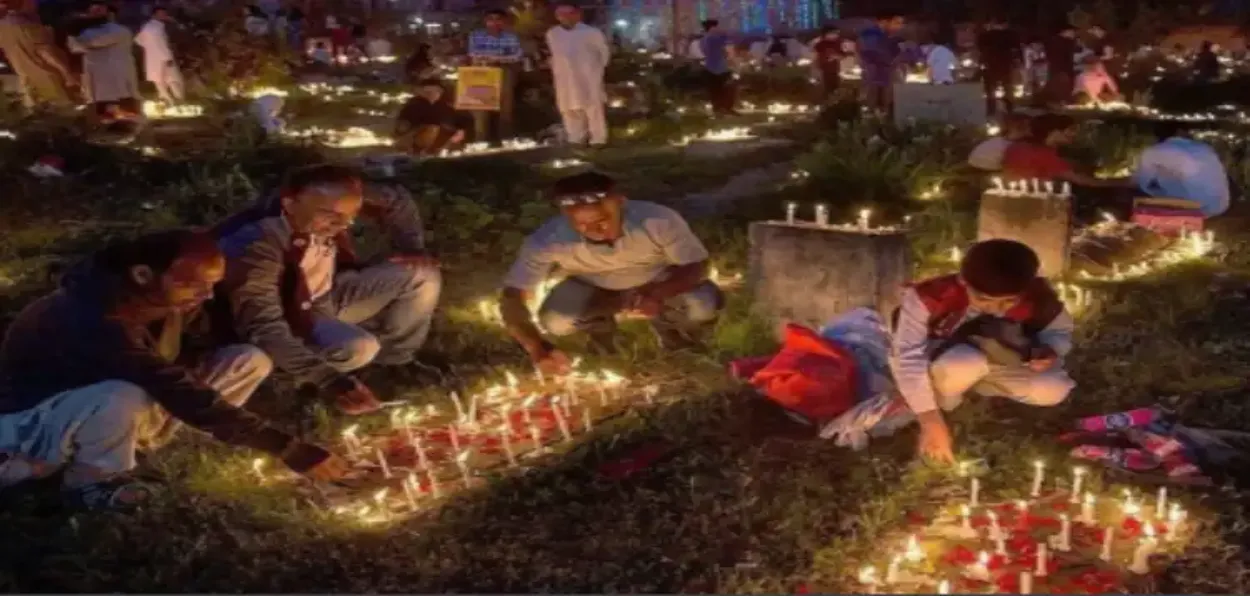
Eman Sakina
Also known as Mid Shaban, The Night of Records, The Night of Fortune, and Forgiveness, Shab e-Barat is observed on the 14th night of Shaaban, the eighth month in the Islamic calendar.
Muslims hold that on the eve of Shab-e-Barat, Allah writes the fates of all people for the upcoming year, taking into consideration their past deeds.
Friday Musings
Throughout the Shab e-Barat night, Muslims will offer special prayers, recite passages from the Holy Qur'an, and engage in other religious rites to win the blessings of God for the welfare of humanity.
On Shab-e-Barat night, most Muslims attempt to stay awake in prayer and namaz as much as possible.
For some Muslims, it is also part of Shab e-Barat traditions to visit the graves of their loved ones and pray for the peace of their souls. Many people will fast on the day following Shab e-Barat night and some people will give out food and sweets(specially halwa) to their neighbors and the poor.
It is believed that on this night Allah forgives anyone who asks for it. According to the Hadith or sayings of Prophet Muhammad, Shab-e-Barat is also the night when Allah blesses people for the year ahead.
It is believed that on this night, the doors of pardon and mercy are open and devotees can approach the almighty (Allah) for his mercy. Therefore, Shab-e-Barat is a blissful night for Muslims across the globe.
According to a hadith or record of the sayings of the Prophet Muhammad, “Doubtlessly, Allah surrounds everything on the fifteenth night of Shaaban with his mercy. He forgives all of His creatures except mushriks (polytheists) and those whose hearts are full of hatred or enmity of others...” (Al-Targhib wa al-Tarhib, 2:118.)
Let’s look at this hadith:
The hadith is narrated by Hazrat Ali (a.s) in which Prophet Muhammad (PBUH) said:
“When it is the fifteenth of Shaban, then stand (in worship) at night and fast during the day. Because Allah descends in this night at sunset to the first heaven and says: ‘Is there any seeker of forgiveness, that I may forgive him? Is there any seeker of sustenance, that I may sustain him? Is there anyone in affliction, that I may remove his affliction? Is there anyone like this, like that (and so on)’. This continues until Fajr.” (Ibn Majah)
This hadith of the Prophet gives two kinds of acts of worship a Muslim is to perform during the celebration of Shab e Barat, whereas both these forms of worship share a single goal and that is of asking for anything from Allah Almighty.
The reason why the Prophet commended worshiping at night is the fact that after the sunset of the 14th of Shaban, Allah Almighty comes to the first heaven, from where He calls upon the people and calls them to ask whatever they want and He will grant them. Therefore, no matter what is there that a Muslim wants from life, he or she can ask for it from Allah Almighty during this night. There can be no better significance of Shab e Barat compared to the freedom of asking whatever a person can ask from Allah Almighty, however, to do so a Muslim must take the path of prayers, which makes the appeal more effective and adds to the reward of the Muslim.
Being human is like making errors and mistakes, therefore, it is quite natural that throughout the year a Muslim does make mistakes. The Shab e Barat night is the one in which a Muslim can repent of previous mistakes and sins with a true heart and receive forgiveness from Allah Almighty. It is on this night that a Muslim can turn towards Allah Almighty and find His doors of forgiveness open for him or her. Therefore, every Muslim must make use of this night and repent in front of Allah Almighty so that He forgives the sins that a person committed throughout the year.
In a nutshell, the 15th night of Shaban is one of the blessed and bountiful nights of the Islamic year. A Muslim must make full use of this night and the day that precedes it. He or she must stand during the night praying and asking forgiveness and mercy from Allah Almighty, while during the day, Muslims should try keeping fast to gain maximum benefits and rewards from the blessed night.
'Rehmaton ki hai ye raat,
Namazon ka rakhna sath,
Manwa lena rab se har baat,
Duaon men rakhna yaad,
